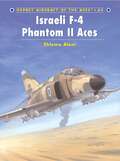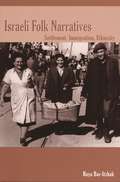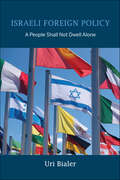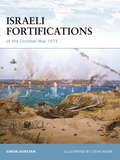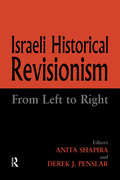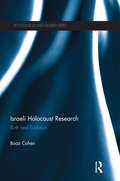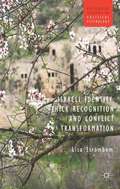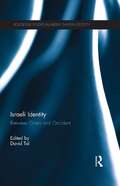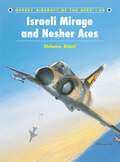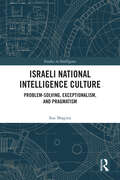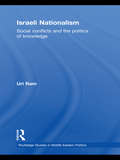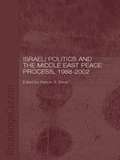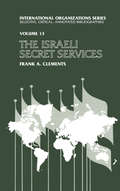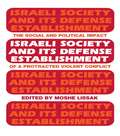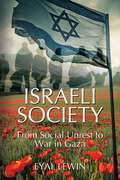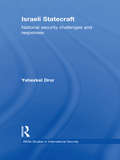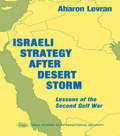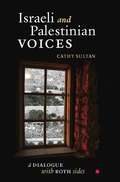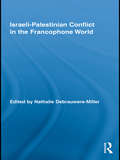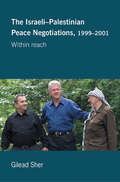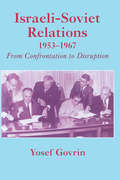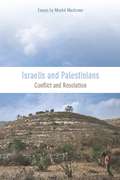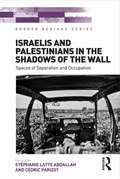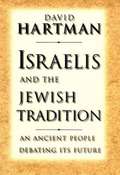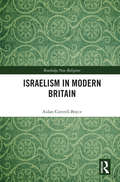- Table View
- List View
Israeli F-4 Phantom II Aces
by Jim Laurier Shlomo AloniThe American manufactured F-4 Phantom II was used by the Israelis in air-to-ground missions, as an attack aircraft, and air-to-air missions as a fighter. Despite performing both roles with equal success the Israeli reliance on the Mirage III and Nesher delta fighters meant that the F-4 was used most regularly in its air-to-ground role. The kill total of the Israeli F-4 community was, consequently, a modest 116.5; significantly lower than that of other Israeli aircraft types in service between 1969 and 1982. A handful of aces were, nevertheless, created and, using first hand accounts, this unique book tells their stories. Many F-4 pilots had previously flown the Mirage III but most of the navigators were either inexperienced flying school graduates or had been transferred from transport aircraft. The decision to create such teams may have appeared an odd one and it certainly led to a number of interesting experiences but proved, ultimately, to be so successful that by 2010 the Israeli air force will have more two-seat combat aircraft than single-seat fighters. The F-4 experience was, therefore, crucial to moulding the future of the Israeli air force.
Israeli Folk Narratives: Settlement, Immigration, Ethnicity
by Haya Bar-ItzhakThe goals and challenges that face the people of Israel are vividly illustrated by the country's many folk stories. Here Haya Bar-Itzhak presents these tales--gathered from the early settlers of the kibbutz, from immigrants who arrived in Israel after independence, and from ethnic groups--to create a panoramic view of a fascinatingly complex society. Creating stories set in the past, even the recent past, is a way for societies to express their problems, adversities, yearnings, and hopes. Bar-Itzhak finds this true among inhabitants of the kibbutz, who find their society at a crossroads as a result of changes in Israeli society at large. She reveals the symbolic dimensions of their stories--some dealing with the death of young soldiers (sacrificed sons) in battle--as pointing to the complexity of a local culture that expresses the ethos of Labor Zionism. In a section dealing with the folklore of immigrants, Bar-Itzhak focuses on the narratives of Yemenite Jews and Polish Jews. Their stories express their traumatic meeting with Israeli society while providing a means for coming to grips with it. The final section, dealing with ethnic folklore of Moroccan Jews, explores the wonder tale through the perspective of disabled and elderly storytellers, who in the language of their community seek to defend their own values and norms, and examines the saints' legends and the body language usually employed in the telling of them. Throughout, the author illuminates the unique challenge of experiencing ethnicity as Jews vis-à-vis other Jews. Israeli Folk Narratives combines new data with insightful analyses. Anyone interested in folk stories and Israeli culture will be enlightened by this sensitive, thought-provoking book.
Israeli Foreign Policy: A People Shall Not Dwell Alone (Perspectives on Israel Studies)
by Uri BialerUri Bialer lays a foundation for understanding the principal aspects of Israeli foreign policy from the early days of the state's existence to the Oslo Accords. He presents a synthetic reading of sources, many of which are recently declassified official documents, to cover Israeli foreign policy over a broad chronological expanse. Bialer focuses on the objectives of Israel's foreign policy and its actualization, especially as it concerned immigration policy, oil resources, and the procurement of armaments. In addition to identifying important state actors, Bialer highlights the many figures who had no defined diplomatic roles but were influential in establishing foreign policy goals. He shows how foreign policy was essential to the political, economic, and social well-being of the state and how it helped to deal with Israel's most intractable problem, the resolution of the conflict with Arab states and the Palestinians.
Israeli Fortifications of the October War 1973
by Steve Noon Simon DunstanThe Bar Lev Line along the Suez Canal was born out of the overwhelming victory of the Israel Defense Forces (IDF) in the Six Day War of 1967. Devastated by their defeat, the Egyptian army began a prolonged campaign of artillery bombardments of Israeli positions causing many casualties. Accordingly, the IDF Chief of Staff, General Haim Bar-Lev, ordered the construction of a series of fortified positions and observation posts that were named the Bar Lev Line by the Israeli press, thanks to its inevitable association with the heavily fortified Maginot Line.This book examines the original 23 positions of the Bar Lev Line, known as Moazims (Moaz is 'castle keep' in Hebrew), each of which were between five and 15 kilometers apart and surrounded by barbed wire and minefields. With rare photographs and cutaway artwork, the design of these positions is described. Finally, the author analyzes the effectiveness of these positions when the Egyptians launched an offensive on Yom Kippur 1973. Manned by just 436 reservists the Moazims were quickly cut off and the Israeli defenders paid a high price with a casualty rate of almost 50 percent. Although widely criticized, the Bar Lev Line proved a success during the war of attrition, and in 1973 it was the political and military failures which allowed the Moazims to be surrounded, rather than the failure of the defensive line itself.
Israeli Historical Revisionism: From Left to Right
by Anita Shapira and Derek J. PenslarThe essays in this volume, by leading scholars from within and outside Israel, shed new light on the Israeli historians' controversy of the creation of the State of Israel, the 1948 War and its aftermath, Israel's attitude towards Holocaust survivors, the "melting pot" absorption policy and similar subjects. The attack on Zionist historiography, which initially came from what is dubbed the "post-Zionist" radical left, has recently broadened to include a critique from the right. These essays cover diverse aspects of the critique, exploring its historiographical, political, sociological and educational ramifications.
Israeli Holocaust Research: Birth and Evolution (Routledge Jewish Studies Series)
by Boaz CohenAn exploration of the development of Holocaust research in Israel, this book ranges from the consolidation of Holocaust research as an academic subject in the late 1940s to the establishment of Yad Vashem and beyond. Research on the story of historiography is often a work on books, on the "final products" that fill academic bookshelves yet, in Israeli Holocaust Research, Boaz Cohen illustrates that the evolution of holocaust research in Israel has a more human element to it. Drawing on knowledge gained through seven years of work in ten major archives in Israel, the author reveals a previously unseen picture of the development of Israeli Holocaust research "from below," and of the social and cultural forces influencing its character. In doing so, a new facet to the picture emerges, of the story beyond the archive and the people who see Holocaust research as their mission and responsibility. This book will be a fascinating addition to the study of Holocaust research and will be of particular interest to students of history, historiography and Jewish studies
Israeli Identity, Thick Recognition and Conflict Transformation (Palgrave Studies in Political Psychology)
by Lisa StrömbomThe divisive and malleable nature of history is at its most palpable in situations of intractable conflict between nations or peoples. This book explores the significance of history in informing the relationship between warring parties through the concept of thick recognition and by exploring its relevance specifically in relation to Israel.
Israeli Identity: Between Orient and Occident (Routledge Studies in Middle Eastern Society)
by David TalFor many years before and after the establishment of the state of Israel, the belief that Israel is a western state remained unchallenged. This belief was founded on the predominantly western composition of the pre-statehood Jewish community known as the Yishuv. The relatively homogenous membership of Israeli/Jewish society as it then existed was soon altered with the arrival of hundreds of thousands of Jewish immigrants from Middle Eastern countries during the early years of statehood. Seeking to retain the western character of the Jewish state, the Israeli government initiated a massive acculturation project aimed at westernizing the newcomers. More recently, scholars and intellectuals began to question the validity and logic of that campaign. With the emergence of new forms of identity, or identities, two central questions emerged: to what extent can we accept the ways in which people define themselves? And on a more fundamental level, what weight should we give to the ways in which people define themselves? This book suggests ways of tackling these questions and provides varying perspectives on identity, put forward by scholars interested in the changing nature of Israeli identity. Their observations and conclusions are not exclusive, but inclusive, suggesting that there cannot be one single Israeli identity, but several. Tackling the issue of identity, this multidisciplinary approach is an important contribution to existing literature and will be invaluable for scholars and students interested in cultural studies, Israel, and the wider Middle East.
Israeli Mirage III and Nesher Aces
by Shlomo Aloni Mark StylingIsraeli delta fighters pilots have been credited with almost 300 kills between 1966 and 1974, and dozens of them became aces. The Israeli aerial kill exchange rate and overall air-to-air performance was phenomenal. Although the Israeli pilots were flying Mach 2 fighters, they lacked any modern radar equipment and their MiG-21 flying opponents should have had a performance edge over them. This book details their most signifcant engagements, many of which were essentially World War 2 style dogfights fought with jet aircraft. Because neither side had the combat edge to disengage at will most engagements were a life and death struggle and the introduction of air-to-air missiles and the Israeli Nesher was to prove decisive in this theatre.
Israeli National Intelligence Culture: Problem-Solving, Exceptionalism, and Pragmatism (Studies in Intelligence)
by Itai ShapiraThe book offers a novel conceptualization of Israeli national intelligence culture, describing the way in which Israelis perceive and practice intelligence.Different nations have different national intelligence cultures, relying on different ideas of intelligence, perceiving and practicing intelligence in different ways. Written by a former senior intelligence officer, this book is the first study dedicated to Israeli intelligence culture and the way it reflects Israeli strategic culture. Relying on more than 30 elite interviews with acting and former Israeli practitioners, the book highlights the Israeli aversion to intelligence theory and scientific methods, as well as to the structured management of the intelligence system at the national level. It describes the intelligence system's emphasis on contrarian thinking and moral courage as the foundations of intelligence professionalism, and the growing inclination of Israeli intelligence toward action and influence. Intelligence is perceived and practiced by Israelis as a tool for problem-solving, addressing unique Israeli challenges. While some traits of the Israeli national intelligence culture have contributed to its high reputation and its ‘success story’, others might have also contributed to its failure in anticipating the Hamas terrorist attack on October 2023 or have remained aspirational norms rather than realized practice. The October 2023 failure, as that of the Yom Kippur War in 1973, will undoubtfully influence Israeli national intelligence culture for many years to come.This book will be of much interest to students of intelligence studies, Israeli politics, strategic studies, and international relations.
Israeli Nationalism: Social conflicts and the politics of knowledge (Routledge Studies in Middle Eastern Politics)
by Uri RamThe question of nationalism centres around the political, social, and cultural ways by which the concept and practice of a nation is constructed, and what it means to its various bearers. This book examines the issue of Jewish-Israeli nationalism, combining a sociological study of national culture with a detailed analysis of Israeli national discourse. Taking an interdisciplinary approach, the author explores the categories of thought that constitute the Jewish-Israeli "nation" as an historical entity, as a social reality and as a communal identity. Unravelling the ways in which Israeli nationhood, society and identity had been assumed as immutable, monolithic and closely bound objects by Zionist ideology and scholarship, he then explores how in modern times such approaches have become subject to an array of critical discourses, both in the academic disciplines of history, sociology and cultural studies, and also in the wider sphere of Israeli identity discourse. This unique study of the issue of Jewish-Israeli nationalism will be of great interest to students and scholars of Israeli Studies, Middle East Studies and Jewish History, as well as those working in the fields of Sociology, Political Science, History and Cultural Studies with an interest in nationalism, citizenship, social theory and historiography.
Israeli Politics and the Middle East Peace Process, 1988-2002 (Durham Modern Middle East and Islamic World Series #Vol. 6)
by Hassan A. BarariThe book is a fresh interpretation of Israeli foreign policy vis-à-vis the peace process, one that deems domestic political factors as the key to explain the shift within Israel from war to peace. The main assumption is that peacemaking that entails territorial compromise is an issue that can only be completely comprehended by understanding the interaction of domestic factors such as inter-party politics, ideology, personality and the politics of coalition. Although the bulk of the book focuses on how internal inputs informed the peace process, the book takes into account the external factors and how they impacted on the internal constellation of political forces in Israel.
Israeli Secret Services (International Organizations Ser. #Vol. 13)
by Frank ClementsThe Israeli Institute for Intelligence and Special Services, the Mossad, is pobably the best known of the world's intelligence services, one of the most sespected and, certainly, one of the most intriguing. However, despite its fame, the available literature, other than Hebrew, is limited and scattered amongst a variety of subject areas because the tentacles of the Mossad are similarly varied. The aim of this volume is to document the range of English language material available on «f Mossad from its pre-official origins in Europe during the Second World War to e present period of the Middle East peace process. The organization had its origins in the aftermath of the Holocaust, being the agency responsible for organizing the illegal Jewish immigration into Palestine before becoming officially constituted in 1951. Since its formation the Mossad has been intimately involved in each of the significant events in Israel's history, including actions against its Arab neighbors, the hunting of wanted Nazis, spectacular actions such as the raid on Entebbe to free the hostages, counter-terrorist activities, and high technology espionage against friend and foe alike. This bibliography will be of interest to researchers covering intelligence activities and to students, scholars, and librarians interested in the history of Israel and its relations with its Arab neighbors. The early material on the Mossad will also be of special concern to students of the Holocaust and its aftermath.
Israeli Society and Its Defense Establishment: The Social and Political Impact of a Protracted Violent Conflict
by Moshe LissakFirst Published in 1984. Routledge is an imprint of Taylor & Francis, an informa company.
Israeli Society: From Social Unrest to War in Gaza
by Eyal LewinThis work constitutes a groundbreaking contribution to the literature of Israel studies. It examines Israeli society's journey through 2023, highlighting its swift transformation from political fragmentation, turmoil, and civil unrest to national unity an
Israeli Statecraft: National Security Challenges and Responses
by Yehezkel DrorThis book offers a systematic examination, analysis and evaluation of Israeli national security statecraft in terms of challenges and responses. Providing an in-depth analysis of Israeli statecraft challenges and responses, this interdisciplinary book integrates social science and security studies with public policy approaches within a long-term historical perspective on the Arab-Israeli conflict. These scholarly approaches are synthesized with extensive personal knowledge of the author based on involvement in Israeli political-security policy making. This book makes use of conceptualizations of statecraft such as 'fuzzy gambling' and interventions with critical mass in ultra-dynamic historical processes to help clarify Israel's main statecraft successes and failures, alongside the wider theoretical apparatuses these concepts represent. While focused on Israel, these theoretical frameworks have important implications for the academic study of statecraft and statecraft praxis worldwide. This book will be of much interest to both statecraft practitioners and to students of Israeli politics and security, the Middle Eastern conflict, strategic studies and IR/security studies in general.
Israeli Strategy After Desert Storm: Lessons of the Second Gulf War (Besa Studies In International Security)
by Aharon LevranIraq's invasion of Kuwait and the Gulf War had a traumatic effect on the Middle East and its implications were particularly serious for Israel, which felt obliged to reassess its strategic and military perspectives. This is an examination of the lessons that the Gulf War holds for Israel.
Israeli and Palestinian Voices: A Dialogue with Both Sides
by Cathy SultanPart travelogue, part history, part sociological investigation, Israeli and Palestinian Voices begins with a fascinating account of Ms. Sultan's determined research trip to Jerusalem and Ramallah to interview many individuals on both sides of the conflict whose voices are seldom heard. <P><P>With her artificial metal knees and indomitable spirit, this American housewife braved checkpoints, barbed wire, and Merkur tanks to visit her informants.These illuminating, detailed interviews are followed by an historical primer for readers on the conflict's growth to its present standoff. Israeli and Palestinian Voices is a work for the interested layperson, a book to open eyes to the human realities of life in Israel-Palestine and to clearly show the thinking on all sides.
Israeli-Palestinian Conflict in the Francophone World (Routledge Studies in Cultural History)
by Nathalie Debrauwere-MillerWith interdisciplinary analyses of texts whose origins span the diversity of the Jewish and Muslim traditions, the provocative essays collected in Israeli-Palestinian Conflict in the Francophone World offer startling insights into the meaning of the volatile history of this conflict in the Francophone world. In France and the Francophone world, the hostilities of the on-going Israeli-Palestinian conflict are consistently reenacted in cultural clashes between the large Muslim and Jewish populations within France and throughout the Francophone Diaspora. The notable scholars appearing in this collection interrogate the complex history of this conflict – from the beginnings of Zionism in 1897 to the first and second Intifada of 1987 and 2000 – and give unique perspectives culled from a diverse range of literary, philosophical, historical, and psychoanalytic frameworks. An important and unique volume, Israeli-Palestinian Conflict in the Francophone World, will shed new light for the reader on the dense ideological antagonisms at the heart of the Israeli-Palestinian conflict and will surely be celebrated as an invaluable resource for scholars, students, and teachers alike.
Israeli-Palestinian Peace Negotiations, 1999-2001: Within Reach (Israeli History, Politics and Society)
by Gilead SherWritten by Gilead Sher, Israeli Chief of Staff during the tumultuous 1999-2000 peace negotiations, this book provides a fast paced description and analysis of the Israeli-Palestinian conflict. Presenting an overview of the core issues of contention, the various key ‘players’ and the possible solutions formulated during the peace process effort, the book sheds new light on the events of that period. An important contribution to the current literature, it provides a fresh understanding of the link between the Israeli-Palestinian conflict and the current global threats of Islamic fanaticism and international terrorism.
Israeli-Soviet Relations, 1953-1967: From Confrontation to Disruption (Cummings Center Series)
by Yosef GovrinAn |sraeli Ambassador's account of the longest and most tense period in Israeli-Soviet diplomatic relations, from their renewal in 1953 to their severance in 1967. His work analyses the era from the month preceding Stalin's death to the weeks following the Six Day War - one of severance, resumption and then severance again- along two parallel processes.
Israelis and Palestinians
by Moshé MachoverThese essays, written between 1966 and 2010 by lifelong Israeli activist and theorist Moshé Machover, cover diverse aspects of Israeli society and the Israeli-Palestinian conflict. Elaborating on the ideas of the Socialist Organization in Israel (Matzpen), two interrelated themes appear throughout the collection: the necessity of understanding the Israeli-Palestinian conflict in a regional context and the connection between Palestinian liberation and the struggle for socialism throughout the Middle East.
Israelis and Palestinians in the Shadows of the Wall: Spaces of Separation and Occupation (Border Regions Series)
by Stéphanie Latte Abdallah Cédric ParizotShedding light on the recent mutations of the Israeli separation policy, whose institutional and spatial configurations are increasingly complex, this book argues that this policy has actually reinforced the interconnectedness of Israelis and Palestinian lives and their spaces. Instead of focusing on the over-mediatized separation wall, this book deals with what it hides: its shadows. Based on fieldwork studies carried out by French, Italian, Israeli, Palestinian and Swiss researchers on the many sides of the Israeli-Palestinian divide, it highlights a new geography of occupation, specific forms of interconnectedness and power relations between Israeli and Palestinian spaces. It offers a better understanding of the transformation of people’s interactions, their experiences and the ongoing economy of exchanges created by the separation regime. This heterogeneous regime increasingly involves the participation of Palestinian and international actors. Grounded in refined decryptions of territorial realities and of experiences of social actors’ daily lives this book goes beyond usual political, media and security representations and discourses on conflict to understand its contemporary stakes on the ground.
Israelis and the Jewish Tradition: An Ancient People Debating its Future
by David HartmanOne of the most important Jewish thinkers in the world today grapples with issues that increasingly distance Israel's secular Jewish community from its religious Zionists. Hartman, who is deeply committed to religious pluralism, suggests a more inclusive and inviting framework for the modern Israeli engagement of the Jewish tradition.
Israelism in Modern Britain (Routledge New Religions)
by Aidan Cottrell-BoyceThis book unpacks the history of British-Israelism in the UK. Remarkably, this subject has had very little attention: remarkable, because at its height in the post-war era, the British-Israelist movement could claim to have tens of thousands of card-carrying adherents and counted amongst its membership admirals, peers, television personalities, MPs and members of the royal family including the King of England. British-Israelism is the belief that the people of Britain are the descendants of the Lost Tribes of Israel. It originated in the writing of a Scottish historian named John Wilson, who toured the country in the mid-Nineteenth Century. Providing a guide to the history of British-Israelism as a movement, including the formation of the British-Israel World Federation, Covenant Publishing, and other institutions, the book explores the complex ways in which British-Israelist thought mirrored developments in ethnic British nationalism during the Twentieth Century. A detailed study on the subject of British-Israelism is necessary, because British-Israelists constitute an essential element of British life during the most violent and consequential century of its history. As such, this will be a vital resource for any scholar of Minority Religions, New Religious Movements, Nationalism and British Religious History.
